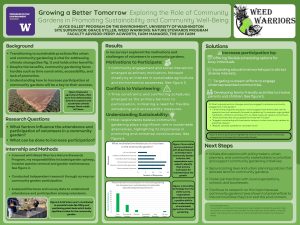Growing a Better Tomorrow: Exploring the Role of Community Gardens in Promoting Sustainability and Community Well-Being
Urban Gardening is a promising solution to the current environmental degradation caused by the agricultural industry. As more of our reality must adapt to the threat of climate change, adopting more sustainable ways of life are crucial, which is how urban gardening enters the picture. A very important aspect of urban gardening is the volunteers and community members that engage in their community gardens and adopt this lifestyle. Growing our own food is not an easy task, and in modern day life, it may not always be the most convenient or accessible. Community gardening is not only a means for sustainability, but community interaction and resilience. The main challenge with promoting community gardening is that there is not extensive research or initiatives that push urban gardening to a wider audience than our immediate vicinity. During my time with Weed Warriors, I got to interact with other volunteers as well as gain personal experience working in a community garden. To learn more about what motivates people to volunteer at their community garden at the location I frequented, I sent out a survey with in-depth questions regarding their experiences they’ve had with community gardening. The survey results show that there are hurdles such as time commitment, however the benefits that a participant experienced while participating at their gardens resulted in an overall response of how positive their experience is when being able to community garden. While this was a smaller data sample, it’s one of the reasons why there needs to be more research into this initiative because community gardens allows us to grow our food sustainability and create a stronger relationship with nature and our community.
